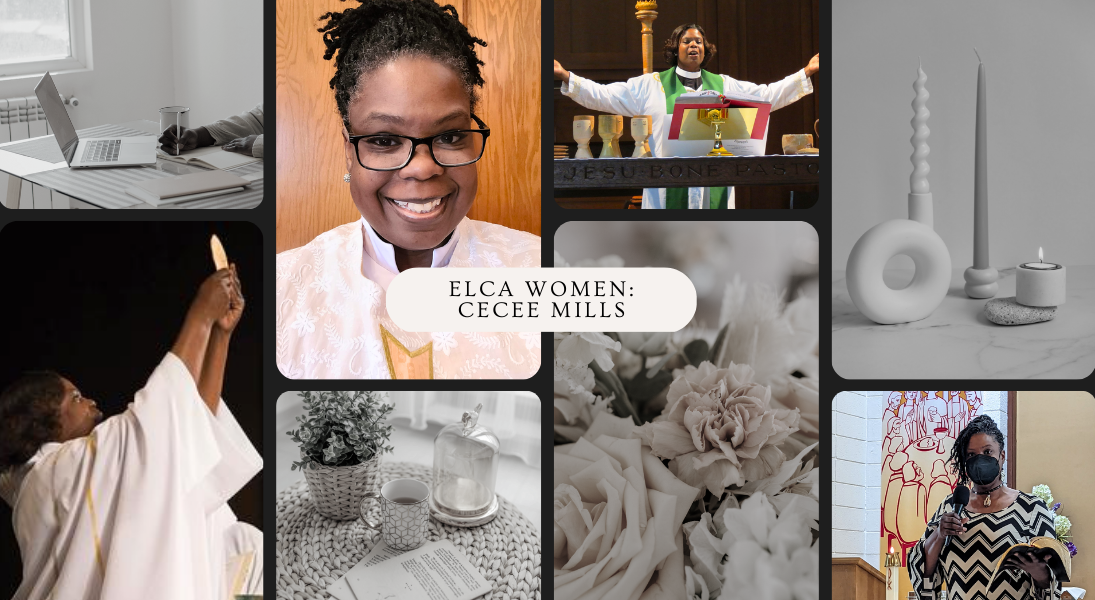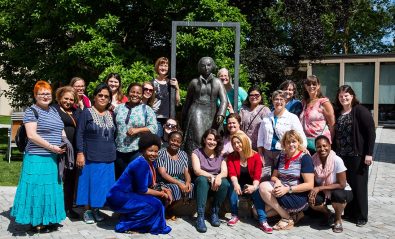As we near the end of Women’s History Month, we would like to feature a few of the women in our church to remind everyone that there are universal and unique ways in which womanhood is celebrated in the church and throughout the nation. Today we are speaking with Lucille “CeCee” Mills (she/her), assistant to the bishop of the North Carolina Synod.
Responses have been edited for publication.
How are you involved in the ELCA?
Assistant to the bishop, North Carolina Synod; Vitality Workgroup convener, (National) African Descent Strategy Team; ELCA coach; convener, ELCA Spiritual Renewal Team; Stewardship leader; Diversity Education and Inclusion facilitator.
What women have inspired you, and why?
Earlean Miller—she was one of my childhood pastors and was the first African-descent pastor in the Lutheran Church in America and likely the world. She came to my church (Prince of Peace Lutheran, Greensboro, N.C.) when I was 9 and saw endless possibilities in me and gave a tangible possibility by serving as my pastor.
Mary Elizabeth Mills, my paternal grandmother, who placed family at the center and is likely why I feel most at home when the community is at the center. She often shared that because she was raised as the only child in the home, she wanted a big family, and she had seven children. She was both loving and refined. She taught us to care for one another and to be respectful. She always made time for us and showed us her love constantly. She taught us how to forgive and give space for difference.
Jackie Grant, a powerful pioneer of womanist theology whom I had the privilege to study under while in seminary. She encouraged me to be my authentic self to uplift my voice, especially in my writing. She created a world in which I had permission to carry my whole self into my theology as a person of faith who was both African-descent and a woman.
How have you seen the role of women in the ELCA change during your time with the church?
This is a difficult question to answer because my childhood church was one that embraced diversity of all kinds. My skewed view of who the Lutheran Church in America was then was perhaps far more inclusive than in the other parts of the church. I have witnessed the movement of more women into synod bishop roles as well as the presiding bishop role. I do not see or believe that has changed the hearts and minds of many in the pews who often see those things as distant from them. As I shepherd the call process in the North Carolina Synod, I witness the hesitation at calling or even discerning with a pastor who was assigned as a female at birth. Often there is a fear that people would leave if they called a woman. It breaks my heart that my church would be guided by sexism in their spiritual discernment. I am grateful for my bishop, Timothy Smith; the staff; and the synod council, who together require congregations who choose to not consider a candidate who was identified at birth as female to have the congregation council make a vote of record and to add it to their ministry site profile. Since this policy was implemented, no call committees have asserted this posture.
Here in the North Carolina Synod as well, when Bishop Smith came on, the staff took time to consider why the senior pastorates in our synod often go to men/males. After holding a series of listenings, several actions were taken to address their lived realities. One of those was a video titled “Seriously?” where the offensive remarks heard by these women/female rostered ministers were read by their male counterparts. It has over 93,000 views. Additionally, we formed a Region 9 core team, which included women/females who served on the synod staff, and have created new policies, modes of reporting, and expanded requirements for boundaries and inclusion education through a regional bishops relational agreement.
I am buoyed by the witness of lay women like Addie Butler and Diana Haywood, both who served as synod vice presidents—and Butler as churchwide vice president. I have seen the gifts of these women, and while they served in these significant roles, I know they are still underutilized and underappreciated. I wonder about those who disagreed with them serving in those capacities and what we are doing to broaden the conversation.
What do you believe are the most pressing issues facing all women today? How can the ELCA help with these causes?
Lower pay. Rethink how salaries are determined for rostered ministers. Join advocacy for fair pay for women in all parts of life.
Critiqued for being assertive and other attributes that would be celebrated in males. Interrupt bias and have the hard conversations in their pews—not at synod or churchwide level.
Critiqued as being sensitive and other stereotypical attributes that demean women. Interrupt bias and have the hard conversations in their pews—not at synod or churchwide level.
Getting a healthy call. Provide better oversight on congregational health and accompany women in such a way that the issues can be addressed whether they are lay or rostered.
How has your faith impacted your understanding of women’s history and the contributions of women to society?
In my understanding, women have been and continue to be the backbone of any faith community. They provide the scaffolding that allows the evolution of most faith traditions. Their impact and influence is often under-told, underestimated and under-realized. In many ways they are an invisible creator of the foundations of faith. Further, faith communities could not survive without them. That horrible saying “Behind every great man is a woman” probably should be “Behind every great man is the woman he shoved behind himself to make himself look greater.” The notion of singular credit is obscene. So much of what we experience is the result of co-creation.
I look at the biblical text and I see the blanks—the unnamed women—the forgotten ones. I also search for the ones who are mentioned—and I watch what they are doing there, and I know without them these texts do not work.
What actions do you think the ELCA could take to better support and empower women within the church and in the wider community?
There needs to be a flattening of power in all expressions of the church. The hierarchical model we have is profuse with sexism, racism and ableism. The community is not at the center, but the elected stakeholders exert power in a feigned representative model with skewed accountability at best. The meetings technically are open but invite the community in as an observer who has voice but no vote. In order for the ELCA to move away from its isms, I believe the power has to be flattened in congregations, synods and the churchwide expressions.
I think the ELCA should commit to investigating and correcting disparities in pay. Create a new way of compensating rostered ministers that does not put the onus of negotiating on the rostered minister. It creates a practice that does the work of monitoring and awarding salaries in a just way. This should be done from the pew up—not from churchwide down.
I think we should invest steeply in the women who are steeply invested in the church. Not only are church women subject to disparities in pay and other discriminatory realities, but all women are. We should be involved with gender justice in all aspects of people assigned female at birth. We should not be preoccupied with just the lived reality of those who identify as Lutheran—but for the sake of the world.









